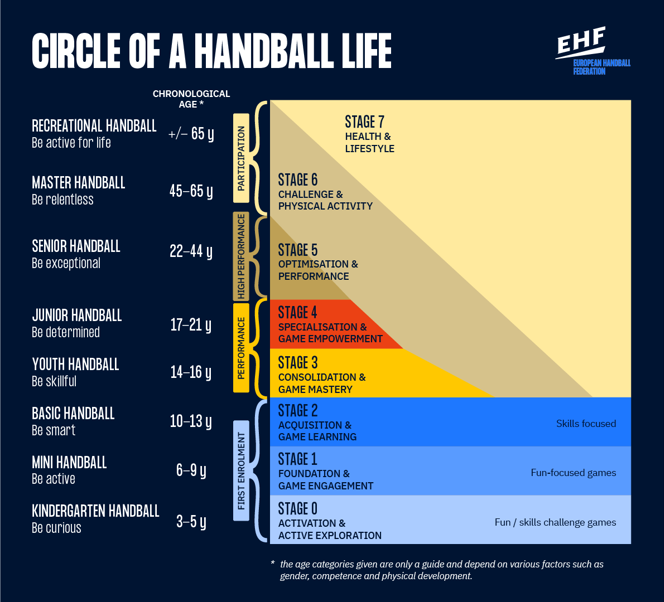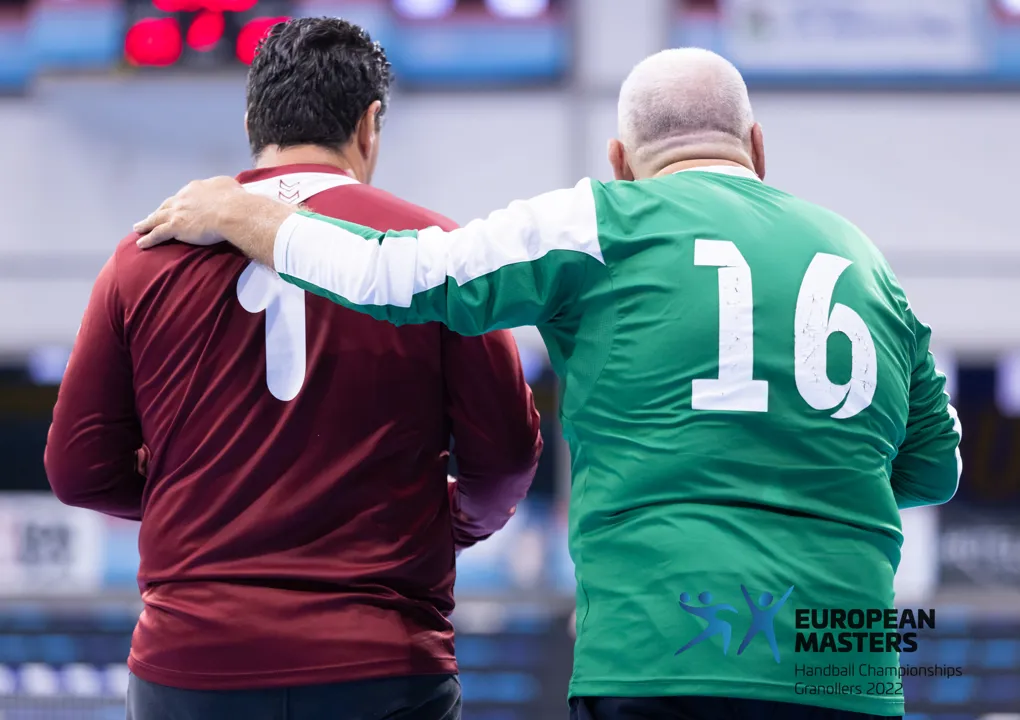The eight stages of the “circle of a handball life”:
- Stage 1: Kindergarten handball (three to five years / activation and active exploration) - motto: be curious!
- Stage 2: Mini handball (six to nine years / foundation and game engagement) - motto: be active!
- Stage 3: Basic handball (10 to 13 years / acquisition and game learning) - motto: be smart!
- Stage 4: Youth handball (14 to 16 years / consolidation and game mastery) - motto: be skilful!
- Stage 5: Junior handball (17 to 21 years / specialisation and game empowerment) - motto: be determined!
- Stage 6: Senior handball (22 to 44 years / optimisation and performance) - motto: be exceptional!
- Stage 7: Master handball (45 to 64 years / challenge and physical activity) - motto: be relentless!
- Stage 8: Recreational handball (65+ years / health and lifestyle) - motto: be active for life!
Every stage of the 'Circle of Handball Life' is divided in the following points: physical aspects, mental aspects, handball and beach handball skills, playing forms and competition and already includes publications such as manuals and brochures.

And giving many examples and even full lessons and training sessions, the manual turns theory straight into the practical work of coaches and teachers, as Pedro Sequeira underlines: "The circle of life manual is for all federations and clubs, which need input, ideas or material for every age group they work with.
"It is for all different types of handball, from kindergarten to walking handball for the elder players, for professionals and non-professionals, for regional, national or international competitions, for school teachers, universities which educate physical education teachers, for referee lecturers and coach education, for beach handball, simply for everybody involved in handball."
One aspect is the variety of the implementation for all target groups, says Sequeira: "Every national federation can adapt this content for their needs, youth training in Germany and Denmark might start earlier than in Georgia or Azerbaijan, some federations might need only little parts, others might use the full programme, as every federation has its own standards in developing players, teams and leagues - and all find many useful examples in this programme. And they just have to look on their current reality, and realise, how their handball is and how it should be - then they find suggestions for their way to go there."
As part of the EHF Masterplan, national federations can apply for a three-year long project including support from the EHF in terms of knowledge, budget, lecturers, coaches and material - "and the circle of life project is ideal for those developing federations as well as it fits for top federations," says Sequeira.
He adds: "Mainly, this programme shall be a motivation for a lifelong handball, as athletes do not have to stop playing handball when they are 40 years old, there is much at stake for older people. Several federations have already started handball-for-health projects like with five-a-side or walking handball, and like for the youth and junior training or beach handball, those concepts were integrated in the 'Circle of a Handball Life' concept. The EHF has always focused on the social side of handball, and this concept exactly mirrors this ideas," says Sequeira.
The Methods Commission Members will constantly evaluate and follow-up on the development of the concept, as the main idea behind the project for Sequeira is that the manual "is not the end, but the beginning. It is an open book, open for new ideas and concepts how to implement handball as a lifelong sports. And we will always be a helping hand to all federations."










